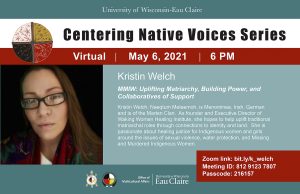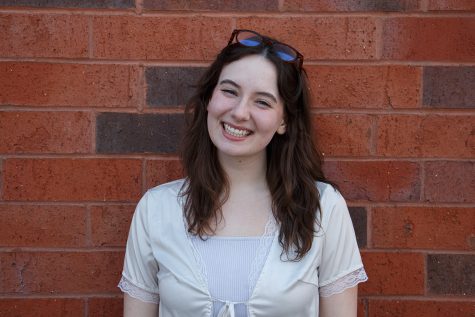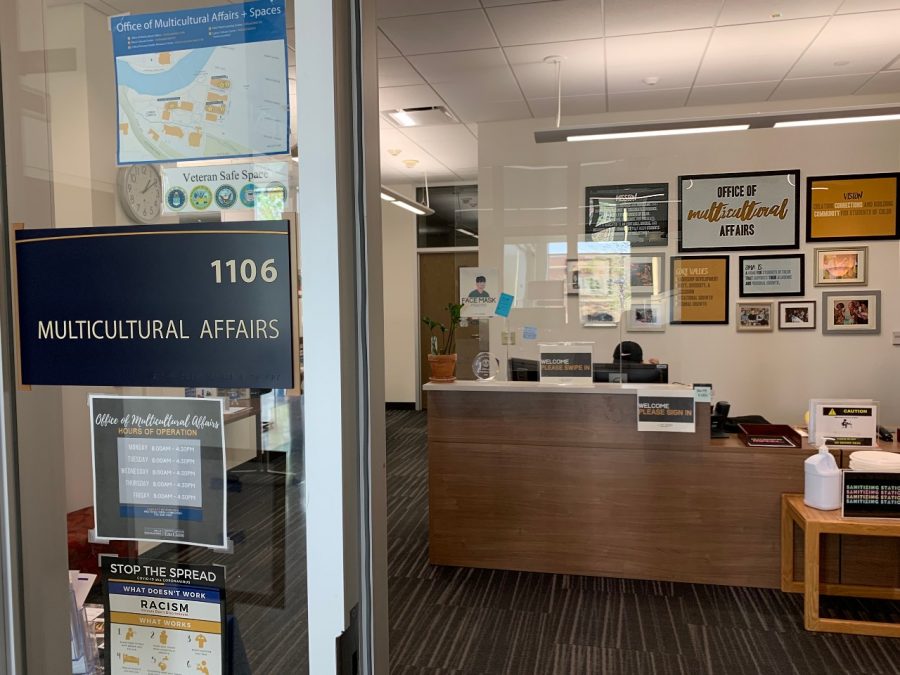Hmong Heritage Month: a recap
Events spread awareness and educate community
Photo by Grace Schutte
“Sometimes you know the person, but you don’t know their backstory. With this month of awareness we wanted to bring appreciation and knowledge to others,” Chang said.
The Eau Claire Hmong Heritage Month was established to promote and educate students and community members about Hmong culture and history, said Melanie Chang, a fifth-year finance student with a certificate in critical Hmong studies.
“I used to think it was all about showcasing Hmong culture, but now I understand it to be a month to celebrate Hmong identity and the lives of Hmong people,” said Tou Ter Lor, a fifth-year integrated strategic communications student with an emphasis in advertising.
According to the Eau Claire Area Hmong Mutual Assistance Association, the Hmong community makes up 3% of Eau Claire’s total population, making them one of the largest minority groups in Eau Claire.
“Even though we do have a large population,” Chang said, “a lot of people still don’t know who we are or how we got here. To try and change that, we dedicate the month of April to spreading awareness about who we are and what we do.”
The celebration, put on by the critical Hmong studies program, was run and organized by a small committee, which Chang led.
It was composed of members from the Hmong Student Association and the Hmong Living Community –– both Hmong student organizations on campus.
Chang wanted to bring in different aspects of the Hmong community into this year’s heritage month, she said. To do so, Chang arranged for several different events to be held throughout the month.
UW-Eau Claire and UW-Oshkosh Hmong Heritage Month Kickoff, April 2
At the event, the importance of Hmong Heritage Month was introduced. The histories of both universities’ Hmong programs were also shared.
Both UW-Eau Claire and UW-Oshkosh have relatively new Hmong programs, Chang said, despite the large Hmong populations at both universities.
Alumni were present to discuss their experiences with getting the programs started, while the new leaders expressed their plans for the future, Chang said.
Culture Core, April 3
In the past, the HSA would hold large conferences –– filling entire ballrooms on the third floor of Davies, drawing in groups from around the Midwest — Chang said.
The conferences would be themed and include guest speakers, various sessions and discussions for participants. This year — being virtual — there was a lower turnout than they would’ve liked. But, Chang said they are optimistic for next year.
Seev Suab, April 8
Next was the Seev Suab event, Chang’s personal favorite. It was a night full of poetry and storytelling.
It was done in collaboration with the HSA, of which Lor is the president. Lor said they assisted in outreach by encouraging students to perform.
“The HSA aims to not only help its members succeed and become active leaders but to also help them find their identity,” Lor said.
He describes it as an environment where people can be genuinely Hmong.
“The night went very deep into Hmong culture and traditions,” Chang said. “We pass down our stories and traditions orally. Because of that, the night had a rich cultural aspect.”
Many of the Hmong organizations on campus share members and it wasn’t difficult to encourage HSA members to go out and participate, Lor said.
Students from across the state performed a variety of events, Chang said, including storytelling, spoken word, traditional instrument playing and singing. Many community members were present as well.
Ma Vang, April 16
In a Zoom event, Vang spoke about her experiences and those of her family. She went over her new book, “History on the Run: Secrecy, Fugitivity, and Hmong Refugee Epistemologies,” which focused on the Hmong experience.
She talked about what inspired her to write her book, how she got to where she is today, leading to an open discussion.
Film Night, April 22
This year, the group watched a popular Hmong dubbed Cantonese comedy.
“I chose ‘Nraug Txuj Kev Hlub’ (‘Flirting Scholar’ in English) because growing up in a Hmong household, we didn’t speak much English. I wanted to bring back childhood memories for the group to reminisce over,” Chang said.
Hmonger Games, May 1
The Hmong Heritage Month was closed out by one final event. It was a scavenger hunt designed to help participants get to know the different Hmong organizations and businesses in the area.
“It was a big, fun scavenger hunt full of small activities we used to do when we were kids, all while tying (to relate it) back to the university,” Chang said.
The current situation
In recent weeks, there has been a rise in anti-Asian hate crimes across the nation. Chang said it was hard to find the right words to describe her feelings toward it all.
“We are so different from each other — our histories are diverse and rich,” Chang said. “It would be so nice for people to be aware of it and appreciate our differences.”
While they are constantly advocating for change, Chang said it comes slowly. She expressed how challenging it can be to change a person’s mind from being close-minded to open –– especially when they don’t want to change.
“Every part of me is shaped by my culture, by my community,” Lor said. “When others don’t learn about that, how can we truly come to an understanding of each other?”
Eau Claire and the Hmong population are a family –– whole — Lor said. But, if they don’t know each other, how they practice, their backgrounds –– are they truly a community?
Chang and Lor believe it was crucial to continue to spread awareness of Hmong culture as the anti-Asian sentiments continued around the country.
“By doing the events this month, it humanizes Hmong individuals and the Hmong identity. We have seen the ‘Chinese Flu,’ the anti-Asian and racist rhetoric perpetuated. But, these events have helped to ensure that our voices are heard,” Lor said.
Lor said he was comforted by the familiar aspects of the events to the point that it felt like being home. From the poems to the songs, to the shared experiences –– he said it became a place where one could be vulnerable.
He said he was grateful for that, especially during these times.
Resources on education, how and where to donate and how to be an ally can be found here.
Schutte can be reached at [email protected].


Grace Schutte is a fourth-year creative writing and Spanish student. This is her fifth semester on staff, having previously served as a staff writer, Chief Copy Editor, a freelance writer, Currents Editor, and now as the OP/ED Editor. She is currently daydreaming about living softly. She is very content.

